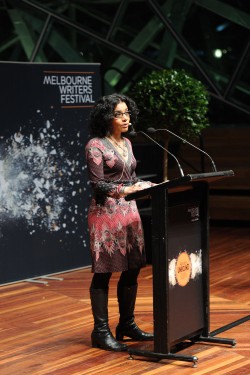Blog Archives
Farewell, MWF 2011
As we decamp from Beer Deluxe, accept that no, we can’t live in the magnificent BMW Edge, and unplug our laptops from ACMI powerpoints, I have to admit it’s nice to have some breathing space and an opportunity to reflect on another brilliant MWF.
Of course, there were some low points. For example, when the MWF team thought up the theme ‘Stories Unbound’, I’m pretty sure they didn’t mean that I should accost festival guests with questionable snippets of my life experience every time I had a wine (or eight). Plus, the usual festival dashing about meant that I didn’t catch all the sessions I wanted to; despite daily trying to one-up festival director Steve Grimwade in terms of how many I managed to see, I had to lie to beat him.
But I am always energised when I reflect upon MWF events, and my memories from the past eleven days provide no exception. Here are my 2011 festival highlights, in no particular order:
1. Peggy Frew’s reading at the launch of The Big Issue fiction edition. Like a lot of festival punters, I’m often in two minds about readings, but when Frew finished reading from her Big Issue story, ‘Camping’, you could hear the audience collectively, finally exhale.
2. Speaking with debut and early-career novelists Melanie Joosten, Jessica Au, SJ Finn and Raphael Brous about love, growing up, work and ghosts in Melbourne’s New Wave
3. The passionate and incendiary Mona Eltahawy on the uprising in Egypt and how it was inspired by and will influence the politics of the Middle East
4. Engaging in a bit of Julia Zemiro-love at Friday Night Live
5. The modest but utterly original César Aira discussing his slim novels and his unusual no-editing, ‘flight forward’ technique
While all these experiences are defined by having been part of MWF 2011, they are also springboards that will propel me into directed and engaged reading for the rest of the year and beyond.
As always, my thanks to the MWF team for an inspiring, varied, well-run and exciting festival. And this year, a guernsey too to Melbourne weather, which was mostly salutary, mostly kind.
What were your highlights from MWF 2011?
The acrobatic intelligence of César Aira
Many well-read locals have unwittingly converged in their recent reading recommendations. The cynosure of their praise, César Aira, is a prolific author whose oeuvre is so extensive and popular at home in Argentina that Michael Greenberg, writing in the New York Review of Books, described it as having ‘engendered a mini-industry in Buenos Aires, involving start-up presses as well as more established publishers that share the job of putting Aira’s work between covers’. There are so many books that no one seems to be able to count them all (counts range from fifty to over eighty). As far as I can tell, though, only five of Aira’s books have been translated into English: Ghosts, The Literary Conference, The Seamstress and the Wind, How I Became a Nun and An Episode in the Life of a Landscape Painter.
Now, when the piper pipes, I follow. So now I have three of these slim volumes in my possession. I read Ghosts before I knew how Aira writes, that he slings his pen around after his thoughts without revising his work, making for an unbelievably unsettling and exhilarating reading experience. If television crime procedurals are at one end of the plot structure spectrum, with their revelations doled out in compact and predictable doses, Aira is continually repositioning the other end of the spectrum with his busy and elastic novels.
Ghosts opens on New Year’s Eve, amid a hot summer’s day of work. Slaving and joking, a group of construction workers are finishing up in order to celebrate freely that night. The night watchman, Raúl Viñas, lives on the top floor of the incomplete building with his family; his children play around the empty swimming pool and gaze out the unfinished walls. The eldest child, Patri, is quiet and dutiful, but entranced by the ghosts who roam the site. Sidestepping the breathlessness often associated with the magic realism of South America, Aira turns his attention to these spectres with the same curiosity and creative logic he applies to everything.
To describe the characters and the events of the novel is not to give a sense of why Aira’s work is so fascinating. Reading Aira is much like hearing a tale as a child, before the idea of story is familiar, both its wonders and its clichés. The formidable power a writer holds becomes salient in Aira’s literary wanderings: we’re held hostage to what Scott Bryan Wilson called Aira’s shifts of attention. Whether it’s the unwittingly comical length of a youth’s hair or a digression on architecture and its relationship to dreams, in Ghosts we reawaken to the radical nature of putting words to paper, and are grateful for the acrobatic intelligence of the scribe committing them there.
See Aira in conversation with his English-language translator, Australian Chris Andrews: in English, 4pm on 27 August; or in Spanish, 2:30pm 28 August.
Or celebrate 75 Years of New Directions, famed publisher of experimentalists Dylan Thomas, Ezra Pound and Cesar Aira. This event is free, but booking is required.

